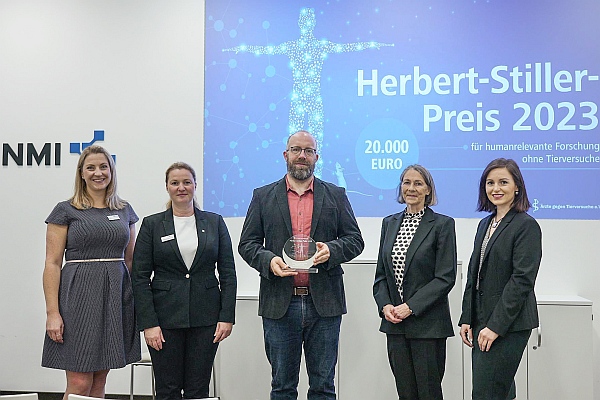Herbert Stiller Prize award ceremony for research without animal experiments in Tübingen
- News
- Dr. Dilyana Filipova
Doctors Against Animal Experiments funds a human Breast-Cancer-on-Chip model
The German NGO Doctors Against Animal Experiments (DAAE) awards this year’s Herbert Stiller Prize amounting to 20,000 euros to Prof. Dr. Peter Loskill and his team at the Eberhard Karls University of Tübingen. With the prize, DAAE supports the development of a promising Breast-Cancer-on-Chip model. At the award ceremony, the winner presented his project and explained how this model can advance both the development of new cancer treatments and the removal of cruel animal experiments in cancer research.
On 12th October 2023, Dr. Loskill, professor of organ-on-chip (OoC) systems at the Eberhard Karls University of Tübingen and head of the 3R Center Tübingen, received one of this year's two equivalent Herbert Stiller Prizes for his outstanding project Breast-Cancer-on-Chip. The prize of 20,000 euros per project is awarded by Doctors Against Animal Experiments (DAAE) for excellent, human-relevant, animal-free research projects and was financed by earmarked donations from nine generous sponsors.
At the award ceremony at the NMI Natural and Medical Sciences Institute at the University of Tübingen in Reutlingen, Prof. Loskill presented his highly promising, state-of-the-art project. Together with his research group, MicroOrganoLab, Prof. Loskill has already developed several human organ-on-a-chip models. These are small devices in which various human cells and tissues are cultured to enable communication between different cells and to allow dynamic analysis and control of experimental conditions. In his planned prize-winning project, Prof. Loskill wants to develop a completely animal-free Breast-Cancer-on-Chip model. Here, patient-specific breast cancer organoids (mini-organs) are grown along with fatty tissue in an environment similar to the human breast. Samples from different patients (e.g. healthy, obese, menopausal) are used to study specific cancer processes and test cancer therapies and drugs. “We envision that such a physiologically relevant human in vitro system will constitute a disruptive milestone in terms of patient-based medicine – for breast cancer treatment as well as the treatment of other cancer entities.” explains Prof. Loskill.
The project is of particular importance not only for human medicine, but also for animal welfare because many very cruel animal experiments are carried out on various animal species for cancer research. In addition, animal-derived components are often still used in the cultivation of modern in vitro models such as tumor organoids, which is associated with considerable animal suffering. Matrigel, an additive for cultivating cells, is usually produced in mouse cancer cells. Fetal calf serum (FKS) is obtained from the blood of unborn calves whose mothers are slaughtered. The current project will be carried out exclusively with animal-free reagents. Thus, it has a double positive impact on animal welfare as it will create an ethical animal-free model with high human relevance in cancer research.
“We are very pleased to support Prof. Loskill’s intricate project and wish his team much success. We hope that many other scientists will take this remarkable work as an example and also focus on animal-free research,” says Dr. Rosmarie Lautenbacher, MD and board member of DAAE, who awarded the Herbert Stiller Prize to Prof. Dr. Loskill on behalf of the organization.
Another Herbert Stiller Prize of the same amount goes to Dr. Stephan Harm and his team from the University of Krems, Austria, for establishing a blood vessel chamber for blood vessel research. The award ceremony for Dr. Harm will take place on 10th November 2023 at the winner's institute.
Both Herbert Stiller Prizes 2023 are financed by the sponsors Florian Buchner, Viviane Frey, Ed Destrée, Margrit Vollertsen-Diewerge, Ralf Hennig, Nina Rettberg, and three other persons who wish to remain anonymous.

Herbert Stiller Prize award ceremony in Reutlingen. Left to right: Dr. Silke Keller (senior scientist at MicroOrganoLab), Prof. Dr. Katja Schenke-Layland (Director of the NMI), Prize winner Prof. Dr. Loskill, Dr. Rosmarie Lautenbacher and Dr. Dilyana Filipova (both DAAE).
Photo free to use; credit: Doctors Against Animal Experiments
